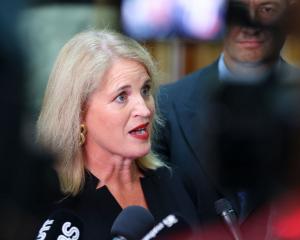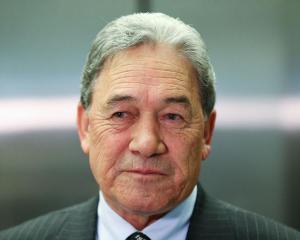
Shaw's return to the job he lost was widely expected. No other candidate was running against him, however party delegates could have chosen to "reopen nominations" for his job, triggering another contest - a symbolic vote of no confidence in his leadership.
Instead, Shaw won the vote convincingly, getting the support of 138 voting delegates, just four voted in favour of reopening nominations.
Shaw said it was an "honour and a privilege to be re-elected as co-leader of the Green Party with the overwhelming support of our members".
"My attention will immediately turn to making sure the Greens are back as part of the next Government, with more Green ministers around the Cabinet table," he said.
His co-leader, Marama Davidson said it was "great" to have Shaw in the co-leadership team again.
"Huge congratulations to my friend James for his election as co-leader. It is great to have him back alongside me as we continue our work for bold action on climate change, policies to heal the damage done to our native wildlife; and for income support that ensures everyone in and out of work can make ends meet," she said.
Shaw was ousted from the job on July 23 in a shock vote at the Green Party AGM. Green Party co-leaders have to be reelected each year by party delegates at the party AGM.
The co-leaders must win 75 per cent of delegate votes in order to keep their jobs. If more than a quarter of delegates vote to "reopen nominations" for the co-leadership, then another vote is triggered.
Despite winning a large majority of delegate votes at the AGM, 32 votes were cast in favour of reopening nominations, versus 75 in favour of keeping Shaw, triggering the current contest.
Since that time, Shaw, who retained his responsibilities as Climate Change Minister, has been touring the country, meeting with party faithful to try and win his old job back.
Other MPs including Chlöe Swarbrick, Elizabeth Kerekere, and Teanau Tuiono were talked about as potential candidates, however none chose to run, leaving Shaw as the only candidate.
This vote was conducted along slightly different lines to the first vote.
The first vote was a secret ballot. Each of the 150 party delegates is meant to vote with the will of their party branch, however there is a suspicion some cast votes against Shaw despite the wishes of their members.
A rule in the constitution, triggered by this second ballot, means that each delegate vote needed to be witnessed by other members, ensuring that no single delegate could vote against the wishes of their branch.
Shaw, who openly mused that he was more popular among members than delegates, likely benefited from this rule.
Shaw has been on a listening tour this month, making the case for his style of leadership which has focused on the importance of being in government.
This has made some members anxious that the party was forgetting its activist roots.
Speaking to the result of the election on Saturday morning, Shaw again made the case for Government.
"There is so much more we need to do," he said.
"Over the next year, I will be pushing hard for action to rapidly cut climate pollution from transport, energy, and agriculture.
"Together, Marama, the caucus and I have a proven track record of bold and lasting change. Our combined leadership skills, particularly on climate change, inequality, and protecting nature, are unmatched by any other political party.
"Working alongside our members and MPs, Marama and I will lead the Green Party into a position where it can truly shape the direction of the next Government," Shaw said.










